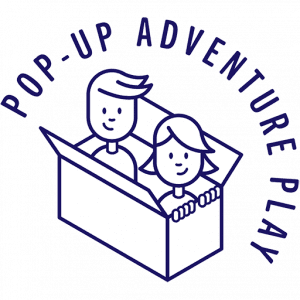We’ve been making pop-up adventure playgrounds, and helping others make them, for 3 years now.
 Our original idea was that they be a lightweight model for community-based playwork, focusing on playing and learning for parents and professionals, that they could invite people from throughout local communities to see children’s play in action, to participate, to help create a collective sense of possibility right there in public space. It was a great way to get conversations started, but we kept saying “there’s more to playwork than what you see here”. There’s also more to Pop-Up Adventure Play than pop-up adventure playgrounds, but that’s another post.
Our original idea was that they be a lightweight model for community-based playwork, focusing on playing and learning for parents and professionals, that they could invite people from throughout local communities to see children’s play in action, to participate, to help create a collective sense of possibility right there in public space. It was a great way to get conversations started, but we kept saying “there’s more to playwork than what you see here”. There’s also more to Pop-Up Adventure Play than pop-up adventure playgrounds, but that’s another post.
Playwork is deeply rooted in the adventure playground movement, which began after the Second World War. At its heart, playwork is about empathetic non-judgment, about following children’s lead in the moment, and about holding the priority of play for its own sake (rather than development or education) to be absolute. We believe strongly that to understand playwork you need time, education, practice and a community of playworkers to talk things over with. We also believe that you need a solid playwork foundation beneath you before you set about designing play-based programming.
“Sounds great,” people would say in emails sent from Costa Rica, Mexico, Canada and more. “Where can I find that near me?”
“Ahh,” we’d reply. “That’s where things get tricky”. Because playwork is not yet globally established, and most of these pop-up adventure playground organisors were the only ones in their country. People kept asking us for our suggestions for online courses they could take anywhere in the world, for the chance to meet one another online, for readings and support as they developed their own playwork practice and figured out how to apply it in the homes they raised their families, the places where they worked, the neighbourhoods they lived in.
So we wrote a playworker developer course.
Now we have 24 students – teachers, parents, therapists, museum educators and parks and recreation staff in 8 different countries, learning about playing and learning in our playworker development course. There are three tutors at present – myself, Suzanna Law and Andy Hinchcliffe. I am academically outclassed, as both Suzanna and Andy are PhD students with Prof. Fraser Brown (editor of Playwork: Theory and Practice and Professor of Play at Leeds Metropolitan University). Each student has a tutor, and together we discuss the articles they’re reading and ways to put these ideas into practice.
My favourite thing has been hearing stories from the individuals about play in their own neighbourhoods and settings. Every individual has their own process of seeing what it really means to support play “for its own sake”, and together we reflect upon the myriad ways in which adults routinely interrupt, adulterate and limit the full rich extent of children’s play. Recognizing this and finding alternatives is a process which the students are beginning – and one which, for playworkers, is never complete.
That’s why we called it the “Playworker Development Course”, because if you’re a playworker then you’re always developing. The feedback has been pretty great.
“Again, I so loved writing this assignment and appreciate being part of this class. I cannot tell you how inspiring this has all been, having a chance to read, reflect and knowing I am a part of something bigger. I feel like I’m riding one of those water slides that has a speed boost and your class is the boost.” (Jill, Texas)
Someone asked me recently what Pop-Up Adventure Play does.
“Well, we believe that play is important for its own sake, and that adults can help make more play possible for children whether they’re parents or professionals or community members,” I said. “We’ve taken elements from playwork, early childhood education and parent support to develop free resources that are available on our website. We work with other organisations, to help them with their play-based outreach and programming, and we also help local organisers to create events and help build local capacity that way. Basically, we take all of these great ideas from different fields and develop flexible strategies that help people find ways to improve the play potential of their settings.”
“You sound busy!” she laughed. “And what’s your long-term goal with all this?” I didn’t have to pause for a second.
“That, over time, we’ll have had a small part in making everywhere better for children’s play, across their lives – in their homes and schools and neighbourhoods, all around the world.”
This person laughed.
“Not too ambitious, then?” She asked.
“Seems about right to me,” I replied.
For more information on the Playworker Development Course, email Morgan at morgan@popupadventureplay.org. She also writes a playwork-oriented blog called PlayEverything.
Have you checked out our free resource, called The Amazing Benefits of Play?
By Morgan